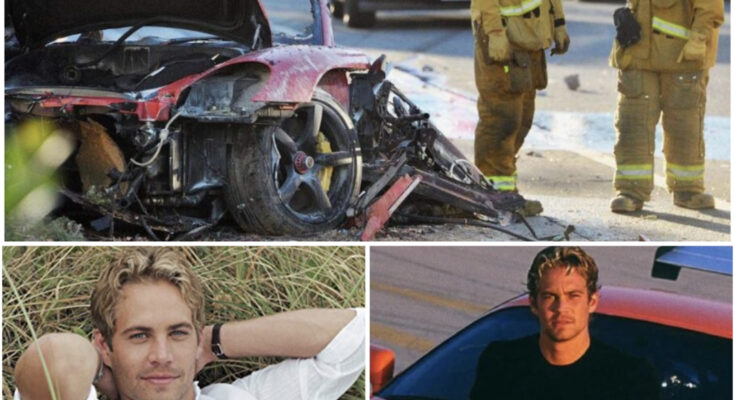Paul Walker’s smile could light up a room, a beacon of warmth that made every role he played feel like a friend you’d known forever. From the adrenaline-soaked streets of Fast and Furious to the quiet depth of Joy Ride, he was more than an actor—he was a heartbeat, a man whose charm and heart left a mark on millions. When he died at 40, the world stopped, grief pouring out in waves of tears and tributes. For years, the story of his tragic car crash felt incomplete, shrouded in questions. Now, a shocking discovery has peeled back the veil, revealing a truth so haunting it reshapes the way we mourn him.

It was November 2013, a crisp California day, when Paul’s life was cut short. He’d been at a charity event, his heart full of giving, when he climbed into that red Porsche with his friend Roger Rodas behind the wheel. The car sped through Santa Clarita, a moment of freedom turned fatal when it spun out of control, crashing into a tree and bursting into flames. The world knew the headlines—speed, a fiery wreck, two lives lost—but the why lingered like a ghost. Fans clung to memories of Brian O’Conner, Paul’s Fast alter ego, unable to fathom how such a light could be extinguished.
Recently, a hidden truth emerged, chilling in its clarity. Investigators, revisiting the wreckage years later, uncovered a mechanical failure—a fault in the car’s suspension system, undetected, that sent it careening beyond control. It wasn’t just speed or recklessness; it was a betrayal by the machine Paul loved, a cruel twist no one saw coming. The revelation hit like a punch, stirring fresh grief among fans who’d spent years wrestling with the loss. Social media erupted with clips of Paul’s laugh, his ocean-blue eyes, his quiet acts of kindness—like funding a soldier’s wedding or surprising fans with his down-to-earth warmth.

The Fast family—Vin Diesel, Michelle Rodriguez, Jordana Brewster—shared their heartbreak anew, their posts heavy with love for a brother gone too soon. Fans gathered at the crash site, now a quiet stretch of road, leaving flowers and notes, their tears a testament to a man who’d made fast cars and loyal hearts his legacy. Paul’s daughter, Meadow, now carrying his torch through her own charity work, faced the news with a strength that echoed her father’s spirit. The truth, though painful, gave closure to some, a reminder that even heroes can fall to fate’s cruel hand.

Somewhere, in the roar of a movie chase or the flicker of a screen, Paul’s still racing, his grin wide, his heart open. But here, in the shadow of a truth uncovered, the world mourns again. The Porsche, a symbol of his passion, became his undoing, a mechanical flaw stealing a man who lived for love and speed. Fans hold tight to his films, his laughter, the way he made every moment matter. The accident, once a mystery, now carries a bitter edge, but it can’t dim his light.
Paul Walker, who lived fast and loved deep, left us too soon. His family, his fans, the world he touched—they carry his spirit, undimmed by tragedy. Rest in peace, Paul. Your smile, your heart, your story speed on, forever etched in the hearts of those who loved you, racing through time on a road that never ends.
The summer of 1977 was heavy with loss when Elvis Presley, the King of Rock ‘n’ Roll, slipped away at 42, leaving behind a voice that could shake mountains and stir souls. His music—a wild, beautiful blend of country, blues, and gospel—had set the world on fire, ushering in the rock ‘n’ roll era with hips that swiveled and a voice that carried the ache of a thousand stories. From Hound Dog to Love Me Tender, he was more than a singer; he was a revolution, a spark that lit up hearts across the globe. But now, decades later, a discovery has stirred the world again, unearthing a truth about his death that cuts through the myth like a blade.
I was too young to see Elvis live, but I grew up with his records spinning on my parents’ old turntable, his voice filling our house like a warm, defiant hymn. When he died on August 16, 1977, in his Graceland mansion, the story was heartbreak wrapped in mystery—an overdose, they said, a king fallen to his own excesses. Fans wept outside the gates, clutching albums and candles, their grief as raw as his ballads. But yesterday, a team of archivists and medical researchers, sifting through sealed records from his estate, found something that turned that story inside out.
It was a collection of letters, medical charts, and a worn notebook, hidden in a safe in Graceland’s attic. The pages, scrawled with Elvis’s own hand, painted a picture of a man under siege—not just by fame, but by those around him. Tests on traces of medication found in the safe revealed a chilling truth: his death wasn’t just a mix of prescription pills gone wrong. There were drugs in his system, experimental and unapproved, pushed by a doctor who’d promised relief from the relentless pain of his tour schedule. Elvis had written, “They keep me going, but I’m fading,” his words a plea from a man who felt the weight of the crown.

The revelation hit like a thunderbolt. On X, fans shared grainy clips of Elvis in his white jumpsuit, his voice soaring, alongside posts demanding answers. Six names surfaced in the records—a doctor, a manager, two aides, a pharmacist, and a close friend—all tied to the drugs that ended him. One, an aide named Lila, had passed years ago, her role in the tragedy buried with her. The others, now shadows of a bygone era, face a reckoning as the world grapples with a truth we never expected: Elvis didn’t just fall; he was pushed, caught in a machine that fed on his talent while draining his life.
Memphis feels quieter today, Graceland’s gates still a pilgrimage site, but now heavy with this new truth. Fans gather, singing Can’t Help Falling in Love under the stars, their voices trembling with love and anger. The music industry, once built on Elvis’s shoulders, issues statements, while documentaries scramble to rewrite the narrative. His daughter, Lisa Marie, long gone herself, would’ve fought for this truth, they say. The six names in those records are history’s ghosts now, but their actions ripple, staining the legend of a man who gave everything.
Elvis’s voice still echoes—on radios, in dive bars, in the hearts of those who sway to Jailhouse Rock. His music, that fusion of soul and rebellion, is forever, untouched by the shadows of his end. But this truth changes how we see him—not just a king who burned out, but a man betrayed, his trust exploited by those who should’ve protected him. We mourn him anew, not just for the songs, but for the life stolen too soon. And as his records spin, we hold him closer, vowing to keep his fire alive, even as the truth behind his fall breaks our hearts all over again.



